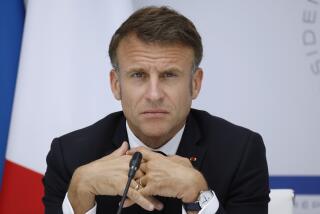Scattered Change Bodes Ill for the Euro
- Share via
PARIS — Suddenly the euro, the proposed European currency that is supposed to make the centuries-old dream of continental union as familiar, real and everyday as the coins jangling in Europeans’ pockets, is in deep trouble.
Most of Western Europe’s leaders, putting their pens to the Maastricht Treaty five years ago, thought a single currency made good sense. Replace francs, guilders and marks with one set of bank notes and coins, and Europe could combat the influence of the U.S. dollar and Japanese yen, end the business disruptions caused by wild exchange rate swings and transform the Old World into a global economic powerhouse.
But after setbacks in France, Germany and elsewhere, financial experts say it now seems inevitable that the blastoff of the euro--scheduled for Jan. 1, 1999, when participating countries are to lock their own currencies into fixed exchange rates--will be postponed or that requirements will be relaxed for those countries wanting to join.
Backing for the euro remains widespread, though countries such as Britain and Denmark are still sitting on the fence.
But ordinary Europeans, and the politicians who represent them, have grown increasingly hesitant, or downright dubious, as the calendar set in motion at Maastricht moves inexorably forward, with the first step in the euro’s launch now only 19 months away.
The blueprint for European economic and monetary union--EMU in the Eurocrats’ jargon--”is in the greatest danger it has been in since its conception,” Alain Minc, a French political commentator, recently summarized.
“Wouldn’t it be a possibility, together with France, to agree to a delay in the start of the euro?” Bundesbank President Hans Tietmeyer was quoted as saying this week in a German magazine. Germany’s central bank later denied he said any such thing.
On Tuesday, Sweden’s Social Democratic Party decided not to even attempt to be among the first wave of countries petitioning for the single currency in May 1998, with Prime Minister Goeran Persson saying the whole venture had become “uncertain.”
The most recent proof of Europe’s mood swing came last weekend in France. Here, voters swept into power a Socialist-led government whose prime minister, Lionel Jospin, a former economics professor, supports the euro but not the bitter pill of austerity that is supposed to precede it.
That tough medicine calls for participating countries to limit inflation to 2.6%, cap long-term interest rates at 8.2% and hold budget deficits and national indebtedness to 3% of economic output.
Jospin also has insisted that the “Club Med” countries--Spain, Italy and Portugal--be included as charter members of the euro club, even if their economies do not clear the demanding hurdles now laid down for membership.
Meanwhile, in Germany, Europe’s mightiest economy, the conservative government of Chancellor Helmut Kohl, the driving force behind the single currency, has hit a snag of its own. Even fiscally prudent Germany, it turns out, cannot meet the Maastricht criteria designed to harmonize Europe’s economies.
The Germans are now bedeviled with sagging tax revenue, a budget deficit that could reach $14.6 billion this year and record unemployment of 4.2 million people. To vault over the Maastricht bar, Economics Minister Theo Waigel on May 26 proposed an accounting trick.
By revaluing German gold reserves--nearly 3,000 tons--from the present bargain price of $95 an ounce to something closer to its real market value of $350 an ounce, Germany could reduce, on paper anyway, its public debt and budget deficit.
The proposal whipped up a hurricane of criticism and plunged Kohl’s government into political crisis, and Waigel backed down Tuesday by agreeing with the Bundesbank to post the results of the revaluing only next year.
But the dispute struck a collective nerve with the Germans, already jittery at the idea of relinquishing the deutsche mark, emblem and motor of their postwar “economic miracle,” for a still-nonexistent money that may be gutted by lax fiscal policies of other, freer-spending countries.
So far, the functionaries at European Union headquarters in Brussels are keeping a stiff upper lip. Yves Thibault de Silguy, the European Commission’s chief for monetary affairs, insisted that consensus behind economic and monetary union was still “rock-solid” after the Socialist victory in France.
But outsiders say something has to give.
“There is a real perception in the markets that the EMU bar has been lowered, that the standards have been lowered,” Steven Englander, vice president and international economist at the Paris office of Smith Barney Inc., said Tuesday. “Even the Germans, the keepers of fiscal orthodoxy, are now seen to be groping through the mud like everyone else.”
In fact, juggling of the books by governments has been so blatant that the rules laid down by EMU may in the end be fully respected only by minor players like Luxembourg.
Italy, for instance, imposed a new and controversial one-time levy, averaging $163 per taxpayer, in an attempt to squeak past the euro requirements by temporarily lowering the budget deficit. In France, to swell government revenues in time for the taking of Maastricht measurements, the former government accepted a check for $6.4 billion from France Telecom in exchange for guaranteeing its employees’ pension rights in perpetuity.
“If this were the private sector, you’d go to jail for such things,” Englander said. But in the race to reach Maastricht’s magic numbers, the economist said, “anything goes, at least in 1997.”
If the project does go forward as scheduled, depending on how many nations join, by mid-2002 euro notes and coins are supposed to replace the estimated 12 billion bank notes and 70 billion coins now circulating in the European Union’s 15 member states.
Delaying the euro would allow Europe’s leaders more time to solve their internal problems but would undermine the credibility of the whole process. Relaxing the rules to admit more countries might be politically expedient, but it would endanger German support and create a weaker currency.
“What will probably happen is that the criteria will be considerably looser, and everybody will find it convenient to close an eye to other people’s sins because that way their own sins will not be criticized,” Italian political observer Sergio Romano predicted Tuesday. “So we will enter Europe sort of limping along.”
Powering the demand for more lax admission requirements is the pain Maastricht-motived spending cuts have caused in countries like France, where even the hint of curbing generous social benefits or selling off money-losing state enterprises is enough to ignite strikes.
“We all stand to gain . . . if Europe no longer means austerity,” French Socialist Party spokesman Francois Hollande said after Jospin’s victory.
German financial circles, however, were skeptical. If the new French prime minister applies only half his campaign promises, it will lead to “real divergences in conception on the euro [with Germany] and risks provoking a delay of the single currency,” said Adolf Rosentstock, economist at the Industrial Bank of Japan in Frankfurt.
Maria De Cristofaro of The Times’ Rome bureau and Reane Oppl of The Times’ Bonn bureau contributed to this report.
(BEGIN TEXT OF INFOBOX / INFOGRAPHIC)
Eurotrouble
To participate in the euro, the common European currency proposed for Jan. 1, 1999, countries must meet guidelines on such economic indicators as inflation, interest rates, deficit spending and national indebtedness. The toughest barrier is a budget deficit of no more than 3% of gross domestic product. Here’s where the countries stand by that measure:
--1.4* Luxembourg
0.9 Ireland
1.7 Denmark
2.4 Netherlands
2.5 Finland
3.4 Belgium
3.5 Sweden
3.8 Germany
3.9 Austria
4.1 France
4.1 Portugal
4.4 Spain
4.8 Britain
6.8 Italy
7.4 Greece
* Luxembourg has a budget surplus.
Source: Eurostat
More to Read
Sign up for Essential California
The most important California stories and recommendations in your inbox every morning.
You may occasionally receive promotional content from the Los Angeles Times.










